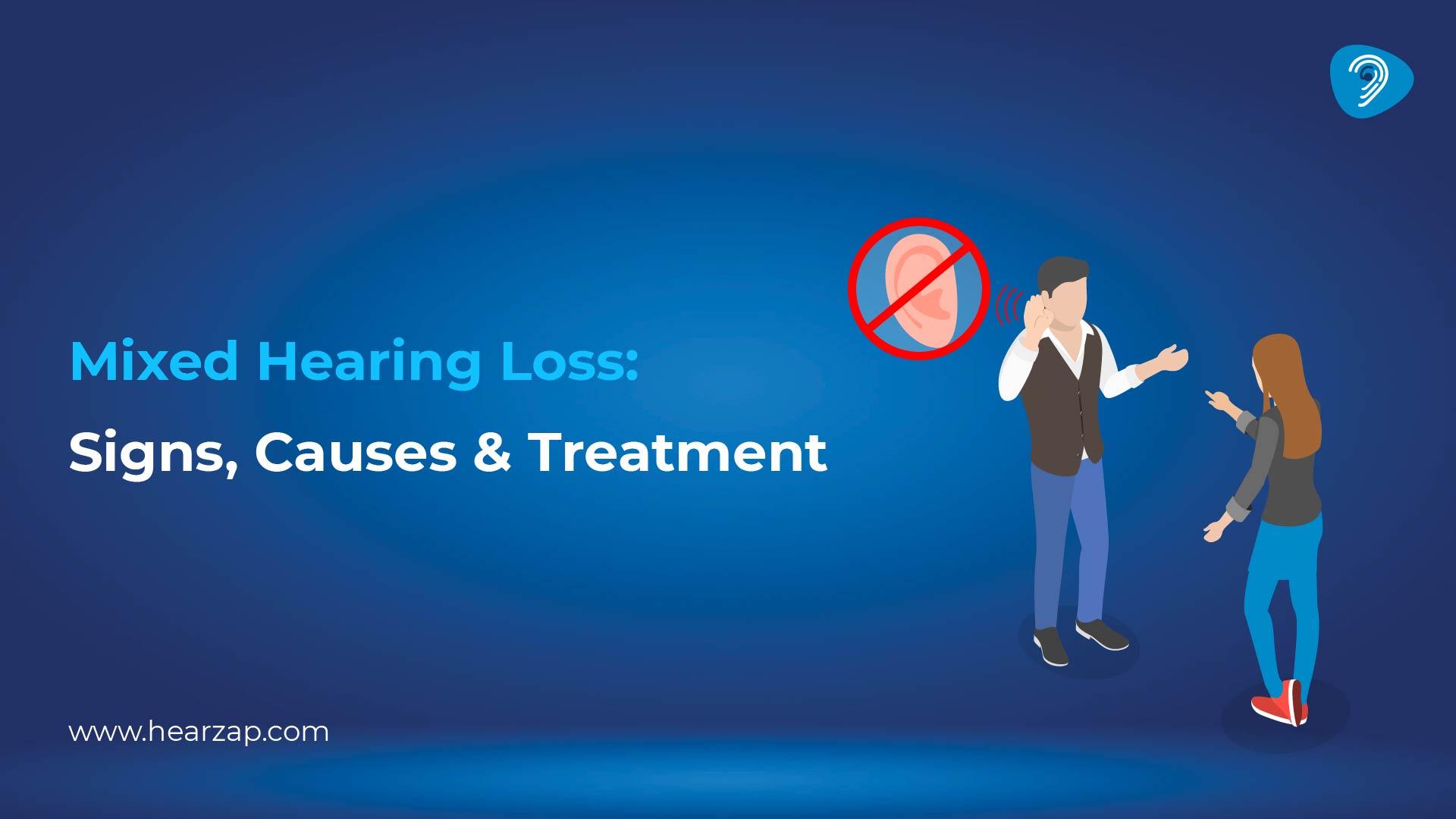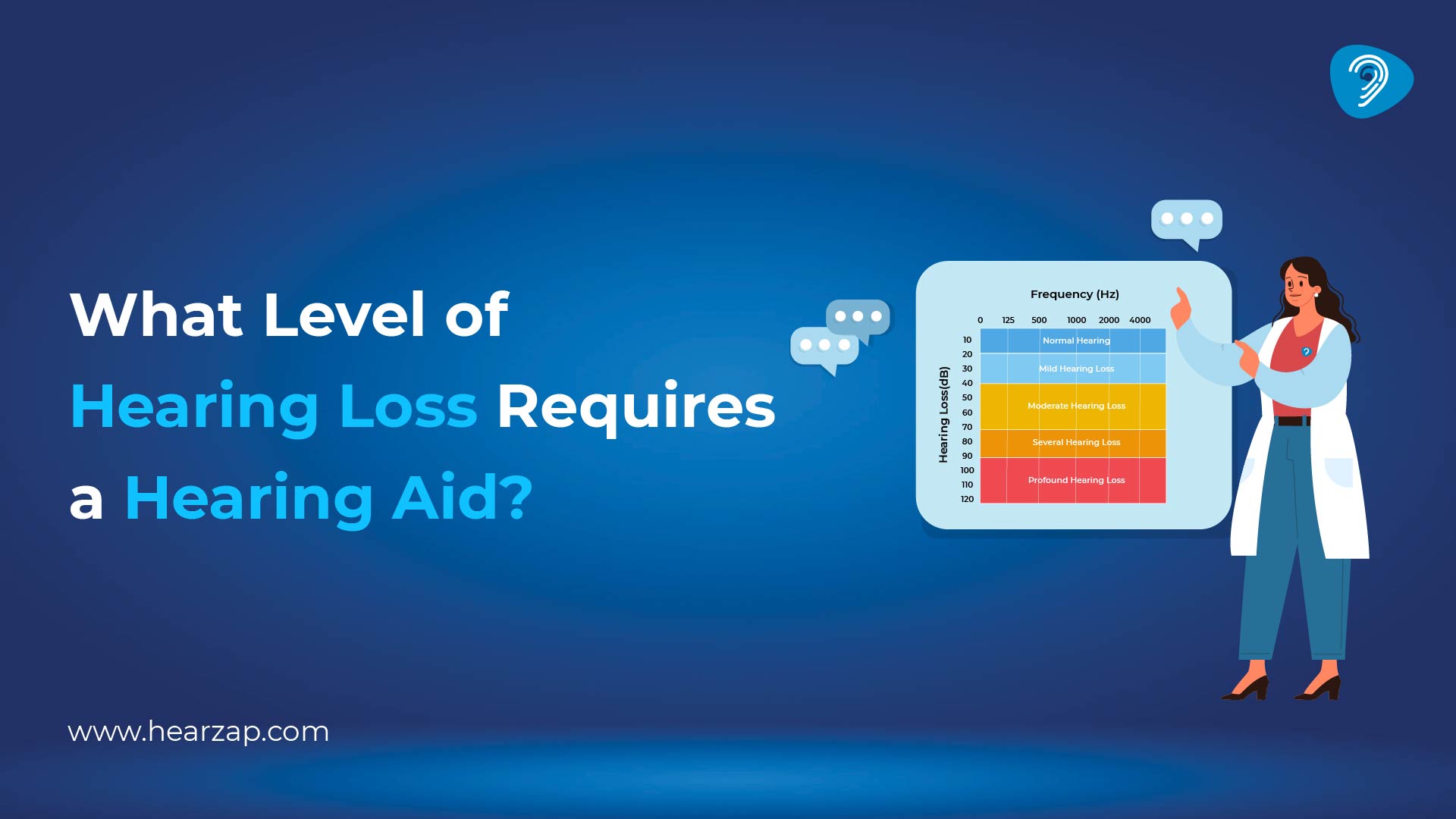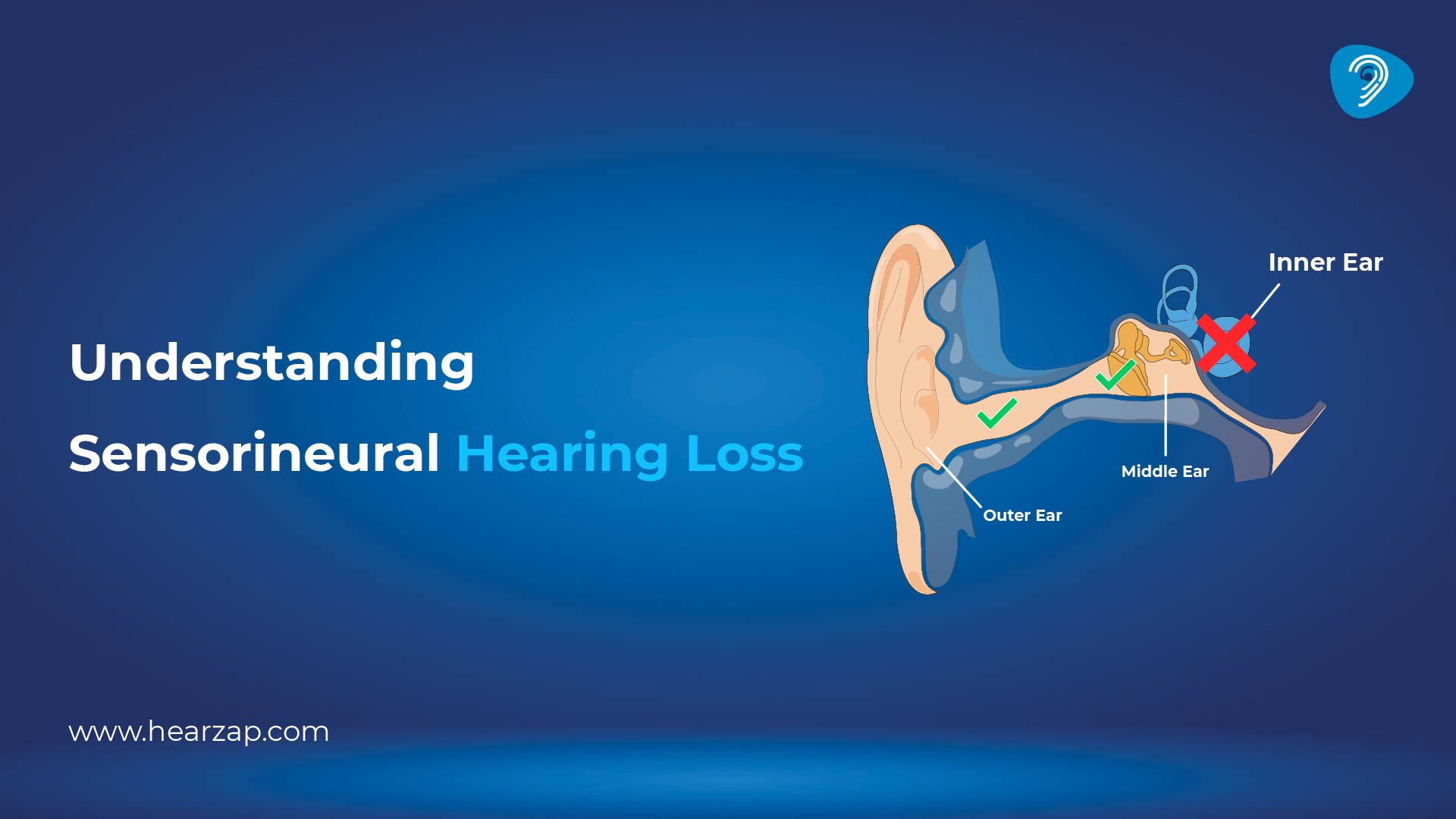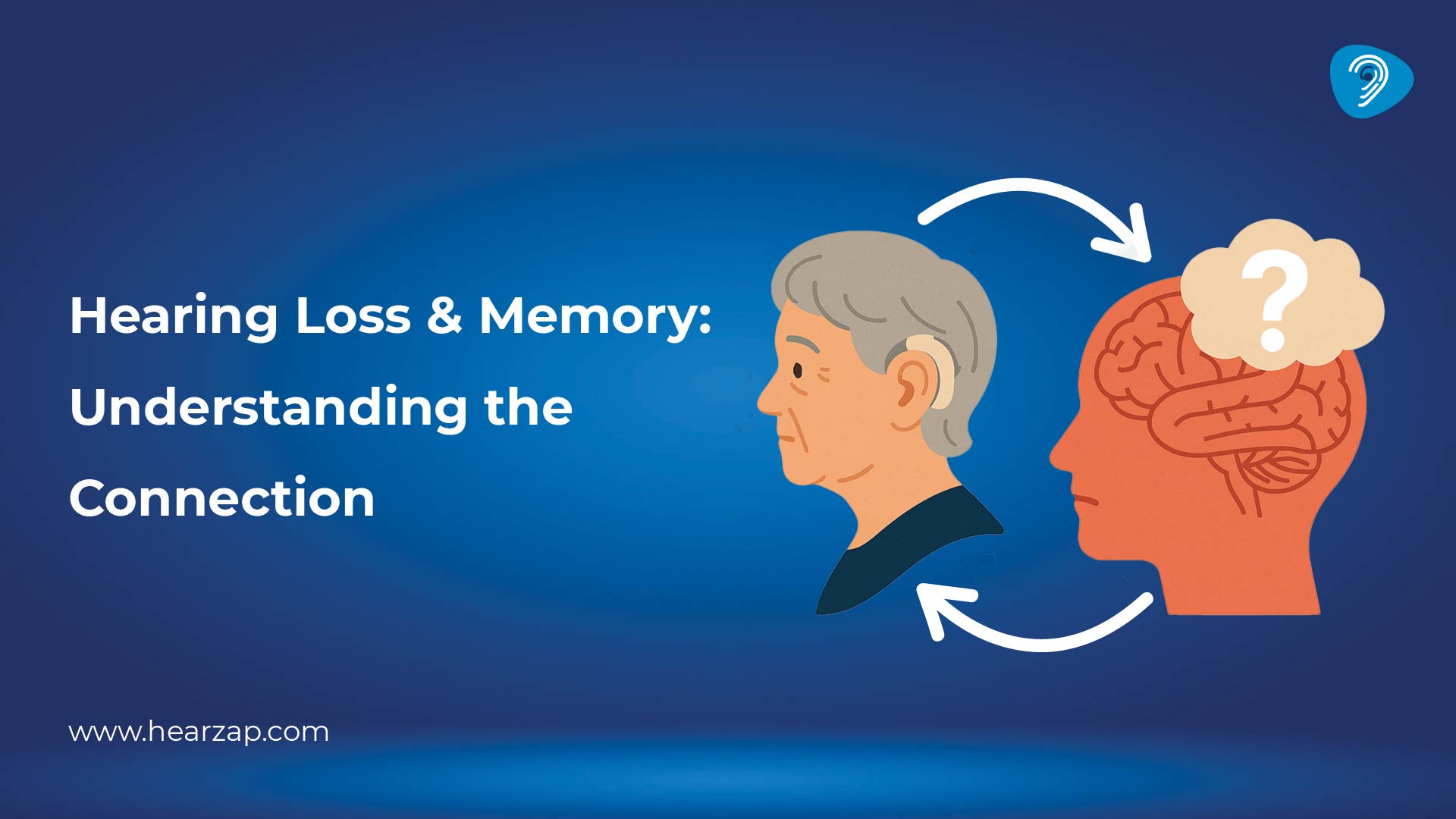HEARING LOSS
Mixed Hearing Loss: Signs, Causes & Treatment
By Team Hearzap | May 28, 2025

If you’ve been noticing changes in your hearing, it’s natural to want to understand what might be going on. Hearing loss can take different forms, and one type that many people don’t hear about often is called mixed hearing loss. It’s important to learn what mixed hearing loss means, how to recognize it, and what treatment options are available. Understanding this can help you take the right steps toward better hearing health.
What Is Mixed Hearing Loss?
Mixed hearing loss is a combination of two types of hearing loss: conductive and sensorineural. Conductive hearing loss happens when there is a problem with the outer or middle ear that prevents sound from reaching the inner ear properly. This could be due to issues like ear infections, earwax buildup, or damage to the tiny bones in the middle ear. Sensorineural hearing loss, on the other hand, occurs when there is damage to the inner ear or the auditory nerve.
This type of hearing loss is often permanent and can result from aging, noise exposure, or certain illnesses. When both these types occur together, it’s called mixed hearing loss. This means you have trouble with sound getting into your ear and also with how your ear processes that sound.
Symptoms of Mixed Hearing Loss
How to tell if you have mixed hearing loss? Some signs can help you identify when it’s time to see a hearing professional. If you are frequently asking people to repeat themselves or struggling to understand conversations, especially in noisy environments, that’s a clear signal. You may also notice that sounds seem muffled or distorted. It could feel like your ears are blocked or full, or you might experience a feeling of pressure. Sometimes, you might hear ringing or buzzing sounds known as tinnitus.
If you feel that your hearing loss comes and goes or changes depending on the situation, it might be related to the conductive part. For example, an ear infection might cause temporary hearing difficulty, but the sensorineural part tends to be more constant. Recognizing these signs early and getting a proper diagnosis is key to finding the right treatment.
What Causes Mixed Hearing Loss?
There are several reasons for the causes of mixed hearing loss can develop. Sometimes it happens because of an ear infection that affects the middle ear, combined with damage to the inner ear. Chronic ear infections, especially if left untreated, can lead to lasting problems. Another common cause is earwax buildup blocking the outer ear while at the same time having some age related hearing damage inside the ear.
Physical injury or trauma to the head can also affect multiple parts of your hearing system, which leads to mixed hearing loss. Certain illnesses and medical conditions can contribute too. For example, otosclerosis is a condition where abnormal bone growth in the middle ear prevents proper sound conduction and can occur alongside sensorineural damage. Understanding the causes can help you work with your audiologist to target the right treatment plan.
How Is Mixed Hearing Loss Diagnosed?
The first in understanding your hearing loss is to see an audiologist for a thorough hearing evaluation. They will conduct tests that measure how well your ears pick up sounds at different pitches and volumes. This helps determine which parts of your ear are affected. You may also have imaging tests or a physical exam to check for blockages, infections, or damage.
Your audiologist will explain your hearing test results in simple terms so you can understand what’s going on. Once the diagnosis is clear, you and your audiologist can discuss the best approach to treatment.
Treatment for Mixed Hearing Loss
Treatment of mixed hearing loss means addressing both the conductive and sensorineural parts. For the conductive issues, treatments might include removing earwax, treating infections with medication, or sometimes surgery to fix problems in the middle ear. At the same time, sensorineural hearing loss is often managed with hearing aids. These devices are specially programmed to amplify sounds and help your damaged inner ear work better.
In some cases, a combination of medical treatment and hearing aids provides the best outcome. Our audiologist will customize a plan just for you, making sure your hearing aids match your lifestyle and hearing needs.
Why You Shouldn’t Delay Getting Help
Hearing loss can affect many parts of your life, from how you communicate to your overall well being. Mixed hearing loss can be especially frustrating because it combines different types of challenges. By getting professional help early, you give yourself the best chance to improve your hearing and avoid feeling isolated or missing out on important sounds.
Taking the Next Step
If you suspect you might have mixed hearing loss, don’t wait. Schedule a hearing test with an audiologist to get a clear picture of your hearing health. With proper diagnosis and treatment, you can regain confidence in your hearing and enjoy life’s sounds again. Your hearing matters, and taking care of it is a choice that pays off every day.
Related Blogs

What Level of Hearing Loss Requires a Hearing Aid?

Noise-Induced Hearing Loss: What You Should Know About

Sensorineural Hearing Loss: Symptoms, Causes & Treatment

Shocking Truth About Environmental Noise Pollution & Hearing Loss

Hearing Loss & Memory: Understanding the Connection
Contact us
We are here for all your hearing needs, from hearing tests to hearing aids. Fill out the form below, and we will give you a call soon.
Please enter a valid mobile number with 10 digits.
Recent Blogs
By None | Feb. 25, 2026
By None | Feb. 20, 2026
By None | Feb. 16, 2026
By None | Feb. 9, 2026
By None | Feb. 7, 2026









